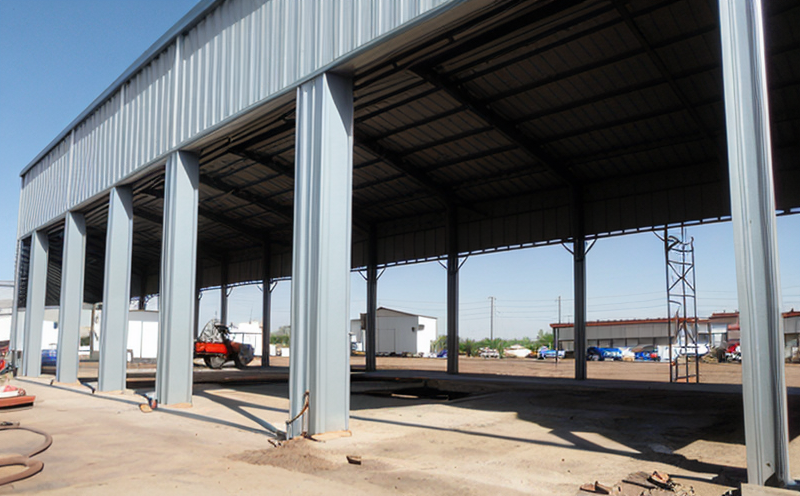EN ISO 7438 Bending and Flexural Verification
The EN ISO 7438 standard is a critical tool in ensuring structural integrity of steel and metal components within the building and infrastructure sectors. This service provides comprehensive verification to confirm that steel sections meet specified bending and flexural requirements as outlined by this international standard.
At Eurolab, our expertise lies in delivering accurate, reliable testing services aligned with ISO standards. We understand that compliance with EN ISO 7438 is not merely a procedural requirement but a commitment to quality and safety. Our team of engineers specializes in conducting these tests using state-of-the-art equipment and adhering strictly to the prescribed procedures.
The process begins with careful selection and preparation of specimens according to the standard's specifications. This includes ensuring that all materials are sourced from reputable suppliers who meet ISO standards themselves. Once prepared, the specimens undergo rigorous testing under controlled conditions designed to simulate real-world stress scenarios.
Our laboratories use advanced bending machines capable of applying precise loads while measuring deflection and strain at various points along the specimen length. Flexural tests follow similar principles but focus on how much a beam bends when subjected to weight or force. These machines are calibrated regularly against international standards like ISO 7438.
After testing, our analysts review all data meticulously before generating detailed reports. These documents outline every aspect of the test including specimen dimensions, applied loads, measured deflections and strains, along with comparisons against acceptable limits defined by EN ISO 7438. Compliance with this standard ensures that structures remain safe even under extreme conditions.
We pride ourselves on providing not just compliance but also valuable insights into potential areas for improvement based on test results. This approach helps clients optimize their processes and ensure long-term durability of their projects.
Scope and Methodology
| Aspect | Description |
|---|---|
| Test Specimens | Steel sections such as I-beams, channels, and other profiles commonly used in construction. |
| Bending Tests | Involves applying a load perpendicular to the axis of the specimen to measure its resistance to deformation. |
| Flexural Tests | Focuses on how much a beam bends under weight or force, crucial for assessing structural integrity. |
| Data Collection | Includes measuring deflection and strain at multiple points along the specimen length during testing. |
| Calibration | All equipment used in these tests is regularly calibrated against international standards like ISO 7438. |
| Data Analysis | Analyzing collected data to ensure compliance with EN ISO 7438 requirements. |
| Reporting | Detailed reports summarizing the entire testing process and results. |
Eurolab Advantages
Our commitment to excellence sets Eurolab apart in providing EN ISO 7438 Bending and Flexural Verification services. With years of experience and cutting-edge facilities, we ensure accurate and reliable results every time.
- Accurate Testing: Utilizing precise bending machines calibrated against international standards ensures consistent accuracy across all tests.
- Rigorous Compliance: Ensuring strict adherence to EN ISO 7438 requirements guarantees compliance while providing valuable insights for improvement.
- State-of-the-Art Equipment: Our advanced testing facilities employ the latest technology available, ensuring reliable and reproducible results.
- Expert Analysts: Leveraging our team of experienced engineers who specialize in structural integrity ensures thorough analysis and reporting.
- Comprehensive Reporting: Detailed reports not only document test outcomes but also offer actionable recommendations for enhancing quality and safety.
Environmental and Sustainability Contributions
The building and infrastructure sectors play a pivotal role in shaping our built environment. Ensuring structural integrity through rigorous testing contributes significantly to sustainability efforts by minimizing risks associated with material failure.
By adhering to standards like EN ISO 7438, we help construct safer buildings that stand the test of time. This commitment to quality also extends benefits downstream, reducing maintenance costs and extending the lifecycle of structures.
Incorporating sustainable practices into our testing processes further enhances these positive impacts. For instance, using recycled steel in specimens or optimizing specimen preparation can lead to reduced environmental footprints without compromising on performance.
Our services contribute to a more resilient infrastructure capable of withstanding natural disasters and other adversities. This resilience is crucial for promoting sustainable development that meets current needs without compromising future generations' ability to meet theirs.





